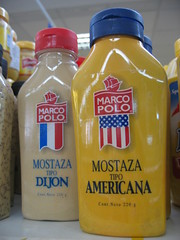The politics of being "American"
6 June 2007
3:39 PM
A different language and a different culture can make even the simplest of things difficult. In Chile saying where you’re from isn’t a simple matter. In English, I’m American. In Spanish, saying soy americano is as likely as not to upset someone. The reason is that people in South America learn that the Americas are a single continent and all those who inhabit it are Americans. When you tell someone that you’re americano, often you’ll get a sardonic, “Yeah? Me too,” in reply, followed by a remark that people from the U.S. always forget that the rest of the continent even exists.
The next option is what is taught in most U.S. Spanish classes, soy estadounidense, literally, “I’m United Statesian.” I often opt for this adjective, but it’s not problem-free either. Mexico is formally the United Mexican States, so the possibility for confusion exists, although it’s uncommon.
At least in Chile, though, you don’t hear estadounidense much. Instead people say norteamericano, North American. They tell me I’m North American, ask me if I have visited North America, compliment my North American jacket, and rant about the latest decision of the North American government. When people begin the americano argument with me, I point out the parallel inaccuracy from our point of view of talking about Mexico, Canada, and the U.S. as if they were a single country. The typical reaction has been, “You say Mexico’s part of ‘North America’?” Turns out our atlases are different too.

To complicate matters, commercial packaging routinely refers to U.S.-style products as americano. Our ruffled potato chips are sold here as corte americano—American cut—our yellow mustard as mostaza tipo americana, and our cream cheese as estilo americano. On top of that, books and movies occasionally use americano to mean not just any inhabitant of the Americas, but instead a citizen of the U.S.A.
It’s not hard to see why even foreigners here quickly pick up the word gringo to describe themselves. Here the word doesn’t have the pejorative sense it connotes farther north. Isabel Allende, the Chilean author, writes that gringo is “generally what we call anyone with light hair or whose native language is English.”
The matter is confusing, but such is the nature of living in another culture. You adapt or you break, and I have opted for adaption, despite some hairline fracture lines in my sanity that suggest I haven’t always done so. I don’t use americano because this is their culture and their language, so I’ll play by their rules. Discussions don’t always end there, however, because some people object not only to the use of americano in Spanish, to which I say OK, but also to the use of American in English, to which I say whoa. Now we’re talking about my language and my culture, and I’m a resident expert in that.
Dictionaries probably list multiple entries for American, one of which signifies anyone from the Americas, but I also guarantee that one definition means a citizen of the U.S.A. because that’s what it means in every country where English is the everyday language. If you look at American at dictionary.com or Google’s define feature, that’s what you see:
- of or pertaining to the United States of America or its inhabitants: an American citizen.
- of or pertaining to North or South America; of the Western Hemisphere: the American continents.
- of or pertaining to the aboriginal Indians of North and South America, usually excluding the Eskimos, regarded as being of Asian ancestry, and marked generally by reddish to brownish skin, black hair, dark eyes, and prominent cheekbones.
One way to resolve the matter, on both the English and Spanish sides of the discussion, is to recall rule one of language learning: the most obvious translation isn’t always the most accurate. Tranquilo looks like “tranquil,” but it’s better translated as “calm” or “quiet.” Grosero can mean “gross,” but it is usually “rude.” So too it is with American and americano. “American,” despite all appearances, is estadounidense or norteamericano, and vice-versa.Rule two of foreign languages is that sometimes it just takes more words to say what you mean. If you want to talk about North America in Spanish, norteamericano won’t cut it; you’ll have to name Canada, Mexico, and the U.S. individually. And to say americano in English, you’ll want some phrase like “from the Americas.” This all holds unless rule three comes into play: try as hard as you will and you may still get it wrong.
No matter, I have sorted it out for myself. I’m American and also norteamericano.

Comments